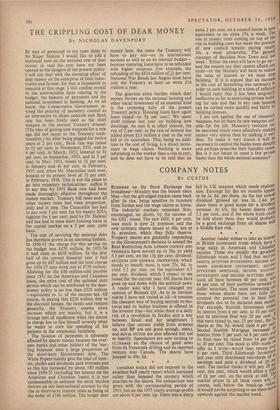THE CRIPPLING COST OF DEAR MONEY
BY NICHOLAS DAVENPORT
BY way of postscript to my open letter to Sir Roger Makins I would like to add a statistical note on the national cost of dear money in case his eyes have not been opened to the dangers of the present policy. I will not deal with the damping effect of dear money on the enterprise of both indus- trialist and farmer, for that is impossible to measure at this stage. I will confine myself to the ascertainable facts relating to the budget, the balance of payments and the national investment in housing. As we all know, the Conservative Government re- vived the practice of monetary control as an alternative to direct controls and Bank rate has bcen freely used as the chief weapon in the ancient Treasury arsenal. (The idea of getting new weapons for a new age did not occur to the Treasury tradi- tionalists.) So, after being pegged for twelve years at 2 per cent., Bank rate was raised to 21 per cent. in November, 1951, and to 4 per cent. in March, 1952, lowered to 31 per cent. in September, 1953, and to 3 per cent. in May, 1954, raised to 31 per cent. in January and 41 per cent. in February, 1955, and, when Mr. Macmillan took over, hoisted to its present level of 54 per cent. in February, 1956. This is not the place to go into monetary technicalities: suffice it to say that by 1955 Bank rate had been made thoroughly effective throughout the money market : Treasury bill rates and all other money rates had risen proportion- ately and in step. The Chancellor has had to pay over 5 per cent. for his weekly IOUs (against the 1 per cent. paid by Dr. Dalton) and has had to issue short funding loans in the capital market on a 5 per cent. yield basis.
The cost of servicing the national debt has therefore grown in an alarming fashion. In 1950-51 the charge for this service on the budget was £470 million. In 1955-56 it had risen to £638 million. In the first half of the current financial year it had gone up by £47 million and the total charge for 1956-57 may work out at £730 million. Allowing for the £40 million-odd payable since 1951 on the American and Canadian loans, the extra cost of the national debt service which can be attributed to the dear- money policy is no less than £220 million —equivalent to ls. of the income tax. Of course, in paying this £220 million fine to the discount houses, the banks and rentiers generally, the Treasury creates extra incomes which are taxable, but it is a strange sort of madhouse when the doctor in charge has to fine himself severely when be wants to curb the spending of his patients in the communal tuckshop.
The balance of payments is adversely affected by dearer money because the over- seas banks and other holders of the 'ster- ling balances' own a large proportion of the short-term Government debt. The White Papers merely give the total of inter- est, profits and dividends paid overseas and as this has increased by about 180 million since 1950-51 (including the interest on the American and Canadian loans) it is not unreasonable to estimate the extra burden, thrown on our international account by the rise in short-term interest rates as being of the order of £100 million. The longer dear
money lasts, the more the Treasury will have to pay out—on its international account as well as on its internal budget— because maturing loans have to be refunded with higher coupons. For example, the refunding of the £824 million of 21 per cent. National War Bonds last August must have cost the Treasury at least an extra £16 million a year.
The grievous extra burden which dear money throws on the national housing and other social investment of an essential kind is the crowning folly of the present Treasury policy. Housing loans have again been raised—to 54 per cent! We spent £640 million last year on building new dwellings. As rent is in effect interest, the rise of 2 per cent. in the rate of interest has added about £13 million a year to the rent bill or its equivalent. This, being an addi- tion to the cost of living, is a direct incite- ment to wage claims. Nothing is more infuriating to the worker than a rise in rent, and he does not have to be told that an extra 2 per cent. on a council house is r equivalent to an extra 17s. a week. rise in money rates coming on top of rise in building costs has made the posit of new council tenants paying nez 50s. a week intolerable. The gene manager of Basildon New Town said week : 'Either the rents will have to go u and the tenants say they cannot afford more—or the Ministry will have to red the rates of interest or we must s building.' If it is argued that an inert in the cost of borrowing was necessary order to curb building in a time of inflat I would reply that it has been singult ineffective so far in restricting private bu ing for sale and that in any case hous can be curbed more quickly and fairly building licences.
I am not against the use of monet weapons, but let them be new weapons s able for the job. Monetary restraint be exercised much more effectively mak money very scarce than by making it v dear. To make it very scarce it will necessary to control the banks more dire( and perhaps prescribe their liquidity rat But is it not better to upset a few priv banks than the whole national economy?










































 Previous page
Previous page